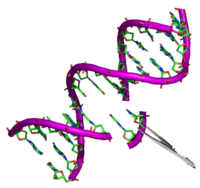
Photo from wikipedia
Fumonisins, which are secondary metabolites produced by some Fusarium species, are detected mainly in corn and corn-based products. Recently, the presence of modified forms of fumonisins in fumonisin-contaminated food products… Click to show full abstract
Fumonisins, which are secondary metabolites produced by some Fusarium species, are detected mainly in corn and corn-based products. Recently, the presence of modified forms of fumonisins in fumonisin-contaminated food products has been reported. In order to evaluate the health risk of modified forms of fumonisins to the Japanese population, we analyzed modified forms of fumonisins in corn-based products retailed in Japan. The modified and free forms of fumonisins in food samples were hydrolyzed by alkaline treatment. The resulting hydrolyzed fumonisins were quantified by LC-MS/MS, and total fumonisins (sum of modified and free forms) was calculated. A total of 166 samples of corn-based products were analyzed over two years. The relative ratios of mean total fumonisins to mean free fumonisins in the cornflakes, corn snacks, corn flour and powdered corn soup samples were 4.7, 2.8, 2.1 and 1.2, respectively. Total fumonisins in the residual solid of five cornflake and three corn snack samples obtained after extraction with methanol-water (3 : 1) were quantified. In the cornflakes and corn snacks samples, 56-72 and 83-98% of the modified forms of fumonisins were present in the residual solid, respectively. The average daily intake of fumonisins from cornflakes and corn snacks by the Japanese population was estimated at 1.1 to 3.9 ng/kg body weight/day when the results of free fumonisins were used for the estimate, but when the results of total fumonisins were used, average daily intake increased about three times and was estimated at 3.3 to 12.5 ng/kg body weigh/day. These results indicate that a risk assessment of fumonisins, including the modified forms of fumonisins, is necessary in order to evaluate the true risk of fumonisins to Japanese people.
Journal Title: Shokuhin eiseigaku zasshi. Journal of the Food Hygienic Society of Japan
Year Published: 2020
Link to full text (if available)
Share on Social Media: Sign Up to like & get
recommendations!